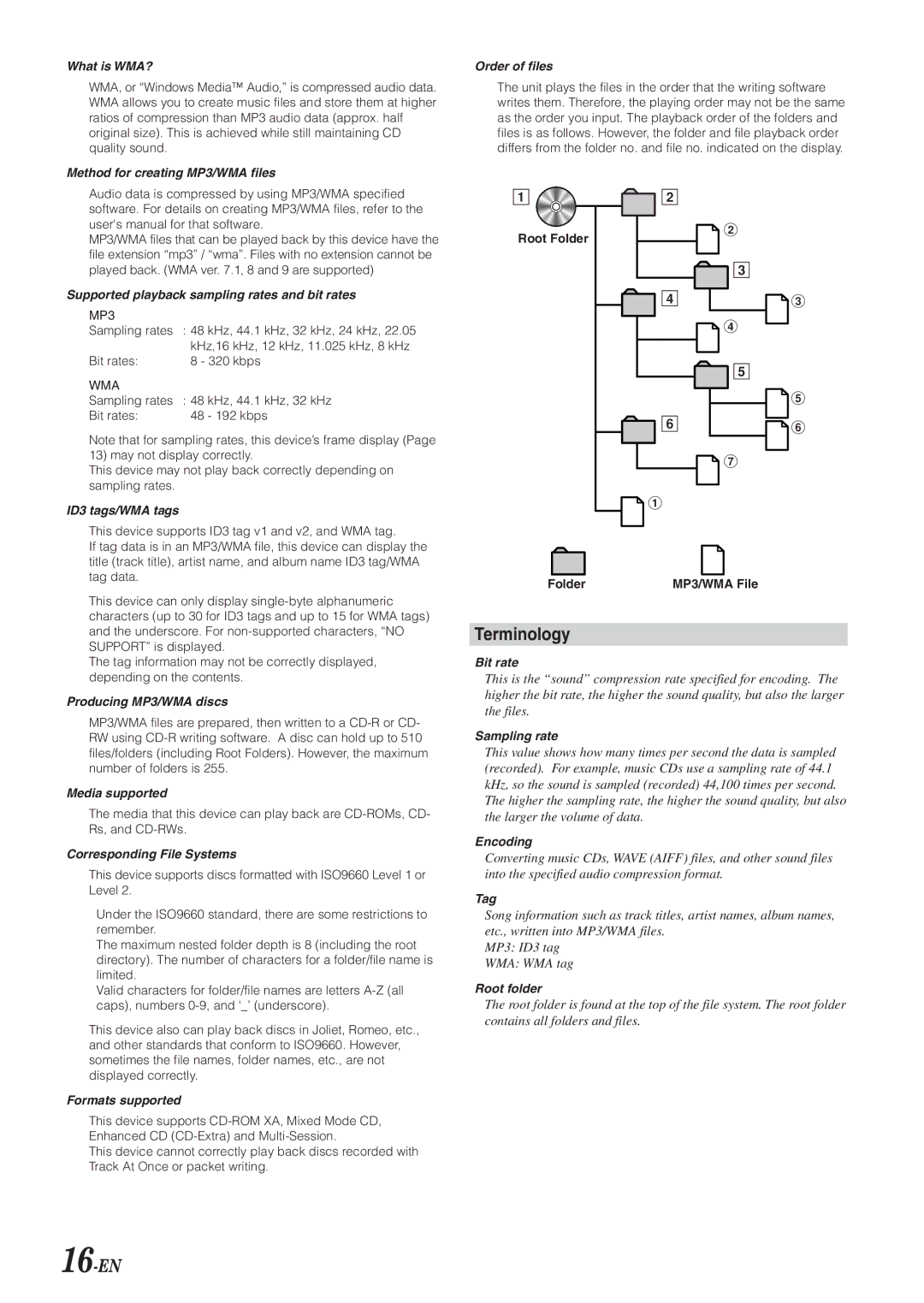
What is WMA?
WMA, or “Windows Media™ Audio,” is compressed audio data. WMA allows you to create music files and store them at higher ratios of compression than MP3 audio data (approx. half original size). This is achieved while still maintaining CD quality sound.
Method for creating MP3/WMA files
Order of files
The unit plays the files in the order that the writing software writes them. Therefore, the playing order may not be the same as the order you input. The playback order of the folders and files is as follows. However, the folder and file playback order differs from the folder no. and file no. indicated on the display.
Audio data is compressed by using MP3/WMA specified software. For details on creating MP3/WMA files, refer to the user's manual for that software.
MP3/WMA files that can be played back by this device have the file extension “mp3” / “wma”. Files with no extension cannot be played back. (WMA ver. 7.1, 8 and 9 are supported)
Supported playback sampling rates and bit rates
MP3 |
|
Sampling rates | : 48 kHz, 44.1 kHz, 32 kHz, 24 kHz, 22.05 |
| kHz,16 kHz, 12 kHz, 11.025 kHz, 8 kHz |
Bit rates: | 8 - 320 kbps |
WMA |
|
Sampling rates | : 48 kHz, 44.1 kHz, 32 kHz |
Bit rates: | 48 - 192 kbps |
Note that for sampling rates, this device’s frame display (Page 13) may not display correctly.
This device may not play back correctly depending on sampling rates.
ID3 tags/WMA tags
This device supports ID3 tag v1 and v2, and WMA tag.
1 ![]()
Root Folder
![]() 2
2
| 2 |
| 3 |
4 | 3 |
| 4 |
| 5 |
| 5 |
6 | 6 |
| 7 |
![]() 1
1
If tag data is in an MP3/WMA file, this device can display the title (track title), artist name, and album name ID3 tag/WMA tag data.
This device can only display
The tag information may not be correctly displayed, depending on the contents.
Producing MP3/WMA discs
MP3/WMA files are prepared, then written to a
Media supported
The media that this device can play back are
Corresponding File Systems
This device supports discs formatted with ISO9660 Level 1 or Level 2.
Under the ISO9660 standard, there are some restrictions to remember.
The maximum nested folder depth is 8 (including the root directory). The number of characters for a folder/file name is limited.
Valid characters for folder/file names are letters
This device also can play back discs in Joliet, Romeo, etc., and other standards that conform to ISO9660. However, sometimes the file names, folder names, etc., are not displayed correctly.
Formats supported
This device supports
This device cannot correctly play back discs recorded with Track At Once or packet writing.
Folder | MP3/WMA File |
Terminology
Bit rate
This is the “sound” compression rate specified for encoding. The higher the bit rate, the higher the sound quality, but also the larger the files.
Sampling rate
This value shows how many times per second the data is sampled (recorded). For example, music CDs use a sampling rate of 44.1 kHz, so the sound is sampled (recorded) 44,100 times per second.
The higher the sampling rate, the higher the sound quality, but also the larger the volume of data.
Encoding
Converting music CDs, WAVE (AIFF) files, and other sound files into the specified audio compression format.
Tag
Song information such as track titles, artist names, album names, etc., written into MP3/WMA files.
MP3: ID3 tag
WMA: WMA tag
Root folder
The root folder is found at the top of the file system. The root folder contains all folders and files.
